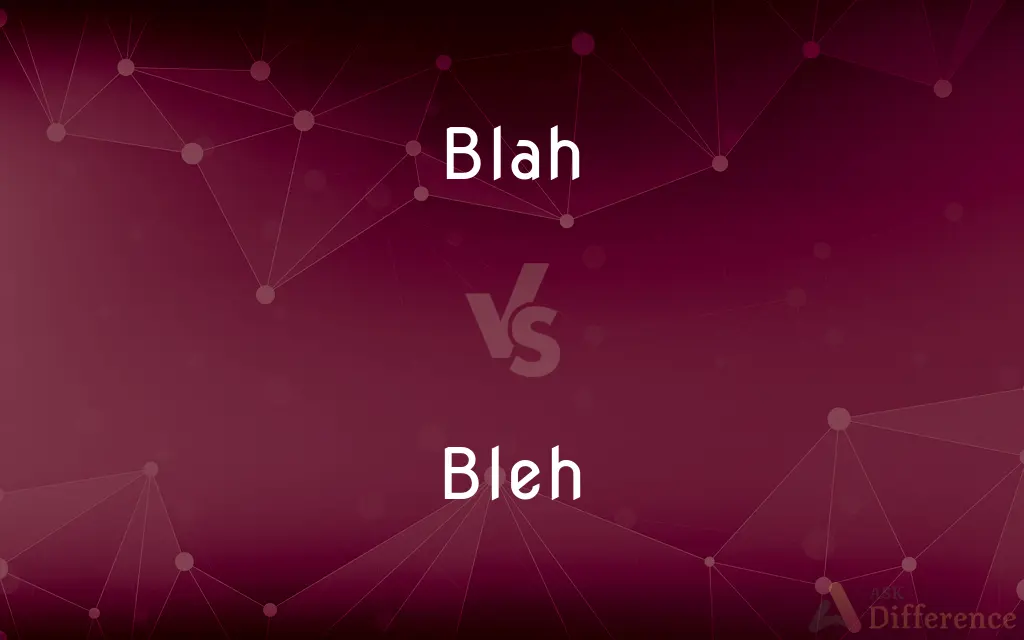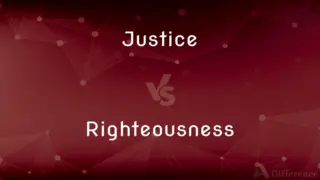Blah vs. Bleh — What's the Difference?
By Tayyaba Rehman & Maham Liaqat — Updated on April 2, 2024
"Blah" often expresses a lack of interest or enthusiasm, while "bleh" typically conveys a feeling of indifference or mild displeasure.

Difference Between Blah and Bleh
Table of Contents
ADVERTISEMENT
Key Differences
"Blah" is a term that encapsulates a general feeling of malaise or dissatisfaction, frequently used to describe uninspiring, boring, or depressive states. On the other hand, "bleh" is more commonly used to express a specific feeling of indifference, mild disgust, or the physical sensation of being unwell or nauseated.
In usage, "blah" can describe both a personal feeling and the quality of something else, such as a dull event or an uninspiring object. It suggests a pervasive sense of lethargy or apathy. "Bleh," conversely, is more frequently applied to immediate reactions, often used to reject something mildly displeasing or to indicate a lack of interest in the present context.
The origins of both terms are somewhat nebulous, rooted in the informal and colloquial language. They serve as examples of onomatopoeic expressions, mimicking the sounds of disinterest and discontent. Over time, "blah" and "bleh" have become embedded in casual conversation, capturing subtle nuances of dissatisfaction or disinterest without needing detailed explanation.
While "blah" might be used in a broader range of contexts, including describing one's mood over a period, "bleh" is often more momentary, linked to immediate sensations or reactions. For instance, a tedious workday might be described as "blah," whereas the taste of medicine might elicit a "bleh."
Despite their differences, both terms are flexible and subjective, allowing individuals to use them interchangeably depending on personal preference or the nuances of the situation. The choice between "blah" and "bleh" can depend on regional dialects, personal expression styles, or the specific emotions one wishes to convey.
ADVERTISEMENT
Comparison Chart
Definition
Expresses a lack of interest or enthusiasm, general malaise
Conveys indifference or mild displeasure, sometimes nausea
Usage Context
Describing boring, uninspiring situations or moods
Immediate reactions to mild displeasure or discomfort
Origin
Informal language, onomatopoeic
Informal language, onomatopoeic
Emotional Connection
Apathy, lethargy
Indifference, mild disgust, unwell feeling
Duration
Can indicate a prolonged state
Often momentary, linked to specific instances
Compare with Definitions
Blah
Used for uninspiring things.
The new restaurant's decor is kind of blah.
Bleh
Expressing mild disgust or displeasure.
The idea of eating broccoli makes me feel bleh.
Blah
Indicating dullness or boredom.
The lecture was so blah, I could barely stay awake.
Bleh
Conveying momentary disinterest.
My thoughts on that movie? Bleh.
Blah
Reflecting a lack of enthusiasm.
His response to the party invitation was just blah.
Bleh
Indicating a feeling of nausea.
After the boat ride, I felt really bleh.
Blah
Describing a lackluster mood.
I've been feeling blah all week.
Bleh
Reaction to something unappealing.
Bleh, I don't want to do homework.
Blah
Conveying a sense of malaise.
Everything seems blah when I'm not motivated.
Bleh
Showing indifference.
Do you want to go out tonight? Meh, I'm feeling bleh.
Blah
Often blah blah or blah blah blah Meaningless or uninteresting remarks.
Bleh
(slang) Used to reflect general indifference to a situation or topic.
- What did you think of the movie?
- Bleh. You?
- Bleh. You?
Blah
Blahs A general feeling of discomfort, dissatisfaction, or depression
"Monday morning Oscar woke up with the blahs" (New Yorker).
Bleh
(slang) An expression of mild disgust, possible imitative of vomiting
Blah
Dull and uninteresting.
Bleh
(slang) Mildly uncomfortable; not good.
I'm feeling a bit bleh.
Blah
Low in spirit or health; down
Sat around all day feeling blah.
Blah
Nonsense; drivel; idle, meaningless talk.
Blah
(informal) A general or ambiguous feeling of discomfort, dissatisfaction, uneasiness, boredom, mild depression, etc.
Blah
(informal) Dull; uninteresting; insipid.
Well, the new restaurant seems nice, but their menu is a little blah.
Blah
(informal) Low in spirit or health; down.
I decided to go exercise rather than sit around all day feeling blah.
Blah
An expression of mild frustration.
Blah! Why can't I get this computer to work!
Blah
(When spoken repeatedly, often three times in succession: blah blah blah!) Imitative of idle, meaningless talk; used sometimes in a slightly derogatory manner to mock or downplay another's words, or to show disinterest in a diatribe, rant, instructions, unsolicited advice, parenting, etc. Also used when recalling and retelling another's words, as a substitute for the portions of the speech deemed irrelevant.
Yeah, yeah, blah blah blah, Mom, you said this all yesterday.
And then he was like, "Oh, my brother's an Internet millionaire, blah blah blah." Like I care!
Blah
Representing the sound of vomiting.
Blah
(intransitive) To utter idle, meaningless talk.
Blah
Pompous or pretentious talk or writing
Common Curiosities
What does it mean when someone says they're feeling "blah"?
It means they're experiencing a sense of boredom, dissatisfaction, or a general lack of enthusiasm.
Can these terms be used in formal writing?
"Blah" and "bleh" are informal expressions and are typically not used in formal writing, except possibly in direct quotes or in a colloquial context.
Why might someone use "bleh" instead of "blah"?
Someone might choose "bleh" over "blah" to emphasize a physical sensation of discomfort or immediate reaction of mild disgust.
Do "blah" and "bleh" mean the same thing?
While they both express negative sentiments, "blah" is more about boredom or a lack of enthusiasm, and "bleh" indicates mild displeasure or disgust.
What's the origin of "blah"?
"Blah" originates from informal, colloquial language, possibly as an onomatopoeic representation of disinterest.
Are there any synonyms for "blah" and "bleh"?
Yes, synonyms include "meh" for indifference or lack of enthusiasm, and "ugh" for a stronger expression of disgust or annoyance.
How do you use "bleh" in a sentence?
"Bleh" is used to express a reaction of mild displeasure or disinterest, such as "I felt bleh after eating too much candy."
Is "blah" a negative term?
Yes, "blah" is generally used in a negative context to describe dull or uninspiring feelings or situations.
Can "bleh" be used to describe food?
Yes, "bleh" can be used to describe food that tastes unappetizing or causes a mild feeling of disgust.
How do cultural differences affect the use of "blah" and "bleh"?
Cultural differences can influence the perception and usage of informal expressions like "blah" and "bleh," with some cultures having their unique equivalents or preferring one term over the other.
Share Your Discovery

Previous Comparison
Dine vs. Eat
Next Comparison
Justice vs. RighteousnessAuthor Spotlight
Written by
Tayyaba RehmanTayyaba Rehman is a distinguished writer, currently serving as a primary contributor to askdifference.com. As a researcher in semantics and etymology, Tayyaba's passion for the complexity of languages and their distinctions has found a perfect home on the platform. Tayyaba delves into the intricacies of language, distinguishing between commonly confused words and phrases, thereby providing clarity for readers worldwide.
Co-written by
Maham Liaqat















































